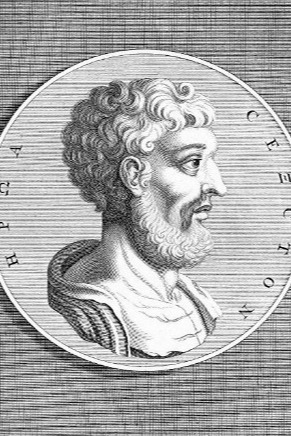Sextus Empiricus
Biography
Sextus Empiricus (c. 160–210 CE) was a Greek philosopher and physician who is most famous for his contributions to Pyrrhonian Skepticism, a school of thought that advocates suspending judgment about the truth of all claims. Although little is known about his life, Sextus Empiricus is one of the most important figures in the history of ancient skepticism. He is best known for his writings, which preserved and expanded the teachings of Pyrrho of Elis, the founder of Pyrrhonism.
Sextus was likely born in Asia Minor, possibly in Alexandria, and he was a member of the Empiric school of medicine, which emphasized observation and experience in the practice of healing. His background in medicine, particularly his understanding of the limitations of knowledge, influenced his philosophical approach.
The Core of Skepticism: Suspension of Judgment
Sextus Empiricus is best known for his writings, particularly the two major works that have survived: Outlines of Pyrrhonism (Ph Pyrrhonian Hypotyposes) and Against the Mathematicians (Adversus Mathematicos). In these texts, he outlines the philosophy of Pyrrhonian Skepticism, which is based on the idea that humans cannot attain certain knowledge of the world. Rather than assert the impossibility of knowledge, Skepticism seeks to suspend judgment (epoché) on all matters, acknowledging that for every argument, there is an equally persuasive counterargument.
At the heart of Sextus’s Skepticism is the doubt that arises when we confront the diversity of beliefs and the conflicting arguments found in human experience. According to Sextus, our senses can deceive us, and reasoning can lead to contradictions, making it impossible to settle on any definitive truth. As a result, the Skeptic philosopher withholds judgment and practices a life of equanimity—a balanced and calm state, free from the turmoil that arises from clinging to dogmatic beliefs.
For Sextus, the goal of skepticism is not nihilism or the denial of the possibility of knowledge but rather to achieve peace of mind through suspension of judgment. By recognizing the limitations of our knowledge, the Skeptic avoids the anxiety and conflict caused by rigid beliefs and instead embraces a life of intellectual humility.
Arguments for Skepticism
Sextus Empiricus provides several key arguments for Skepticism in his writings:
The Problem of the Senses: He points out that our senses can deceive us. For example, a straight stick partially submerged in water appears bent, and objects look different depending on distance or perspective. If the senses can mislead us in such basic ways, how can we trust them to give us access to the true nature of the world?
The Problem of Reasoning: Sextus also emphasizes that human reasoning often leads to contradictory conclusions. For example, one philosopher might argue that the world is eternal, while another might claim that it was created. Since there is no way to definitively prove one side over the other, Skeptics suspend judgment on the truth of such claims.
The Problem of Infinite Regress: When we try to justify our beliefs, Sextus argues, we often face an infinite regress—one explanation leads to another, and another, with no final resolution. This infinite chain of justifications makes it impossible to attain certain knowledge.
The Relativity of Beliefs: Sextus points out that people in different cultures hold radically different beliefs, which can’t all be true. Since we cannot determine which, if any, of these conflicting beliefs is correct, it is better to suspend judgment altogether.
Skepticism and Everyday Life
For Sextus Empiricus, skepticism was not a passive withdrawal from life, but a practical approach that encourages peace of mind. In his view, by recognizing that we cannot be certain about anything, we are freed from the anxiety and dogmatism that often arise from trying to prove or defend our beliefs. This kind of intellectual humility allows one to live more harmoniously with others and to remain open to the diversity of perspectives.
He also suggested that while we cannot know anything for sure, we can still act in accordance with appearances and practical necessity. For instance, we must eat, sleep, and care for our bodies even though we cannot have ultimate certainty about the nature of food, sleep, or health. Skeptical suspension of judgment applies only to philosophical speculation, not to everyday practical life.
Influence and Legacy
Sextus Empiricus's writings were highly influential in the development of later philosophical thought, particularly during the Renaissance and early modern periods. His ideas on skepticism helped shape the works of philosophers such as René Descartes, David Hume, and Immanuel Kant. For instance, Descartes’s method of doubt, which leads to the famous conclusion “Cogito, ergo sum” ("I think, therefore I am"), echoes the Skeptic tradition of questioning everything, although Descartes ultimately sought to establish certainty on the foundation of the thinking subject.
Sextus’s work also influenced the development of empiricism and the scientific method in the modern era. His emphasis on observation and the limitations of human reason aligns with later thinkers like John Locke and George Berkeley, who emphasized the importance of sensory experience in knowledge acquisition.
In contemporary philosophy, Sextus Empiricus’s insights continue to be relevant in discussions about the limits of human knowledge, the problem of relativism, and the role of doubt in inquiry.
Conclusion
Sextus Empiricus stands as one of the most important figures in the history of philosophical skepticism. Through his writings, he made a powerful case for the suspension of judgment in the face of uncertainty, and his ideas continue to resonate in modern philosophical discussions about the nature of knowledge, belief, and the human condition. His skeptical approach is not about rejecting all claims to knowledge, but rather about recognizing the limitations of human reason and embracing intellectual humility.
